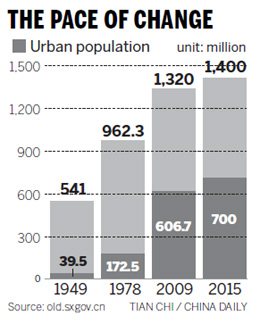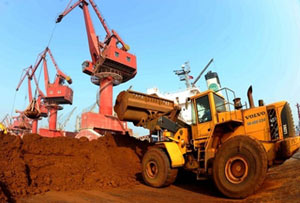InfoGraphic
Big cities, big problems
By Shan Juan (China Daily)
Updated: 2010-11-04 13:32
 |
Large Medium Small |
Yu Zhixu (right), a villager from Lvshun, Liaoning province, stands at the mound of stones next to his home in July in this file photo. Because of a disagreement about the compensation a real estate developer offered Yu to demolish his home to make way for urbanization, the developer blocked his access to the outside by piling sand and stones 3 meters high next to his home. [Photo / China Daily]
Some researchers question whether China's cities are growing too fast

BEIJING?- In the next 15 years, more than 400 million people will be brought from rural areas to cities in China as urbanization is put high on the government's agenda to sustain fast economic growth, experts said.
During each of the next five years, about 10 million rural people will become urbanites and each person who moves to a city will generate an average boost to the economy of 100,000 yuan ($15,000), mostly in property.
Although urbanization will be a major factor in the coming decade in supporting an annual economic growth rate of 9 percent, "the government should be wary of looming problems and should respect people's right of choice," Wang Xiaoyi, a rural problem researcher at the Chinese Academy of Social Sciences, said.
Some local governments moved rural people to cities to drive up the urbanization rate, but did not provide enough public services for them, he said.

In extreme cases, where urbanization was used largely as a pretext to seize land from farmers, forceful demolitions had occurred, experts said.
"That's not real urbanization and it will damage social stability," said Xu Xianglin, an economics professor at the Party School of the Central Committee of the Communist Party of China.
The ultimate goal of urbanization is to spread the benefits achieved in the past 30 years among the rural population and enable them to live better lives in cities, he added.
Wang echoed Xu, saying "officials should not blindly seek a high urbanization rate".
Shan Baobao, a new urban dweller in Xi'an, in Shaanxi province, told China Daily that he was somehow "kidnapped" by the so-called urbanization policy.
"Personally I didn't feel an urge to become an urbanite," he said.
Shan, who had lived south of the city, gave up farming after he began a construction business 30 years ago.
"I earned far more than most of the urbanites and I could enjoy benefits and favorable policies for farmers like roomy housing, the land, and the family planning policy which allows rural people to have a second child if the first is a girl," he said.
In China, the hukou (household registration) system has divided its citizens into two groups: urban residents generally enjoying better healthcare and education; and rural ones who have access to land for farming and housing.
Shan, 56, is living in a rented apartment and is waiting to move into a new apartment assigned to him in a compensation plan, which includes cash and housing.
"With the right to choose myself, I would definitely give up the compensation and keep my previous life," he said, adding that under urbanization he sacrificed his own interests for the development of the city.
On the block where Shan's village of 2,000 people had been located, a high-end commercial district has taken shape, with skyscrapers mushrooming and people swarming in. Most importantly, it has attracted developers from all over China, he said.
By 2015, more than half of the Chinese population will live in urban areas, earlier reports said.
However, unplanned and poorly managed urbanization will bring problems such as insufficient water and sanitation systems, lack of quality food and safe housing, and pollution.
Huge numbers of new city dwellers might also upset social stability and security due to unequal access to resources and welfare, Wang said.
In East China's Shanghai municipality, there are 400,000 children of migrant workers and few of them can get as good an education in the city as their urban counterparts because they do not have an urban hukou, reports said.
They pose a great challenge to public security, particularly after graduation, experts warned. Most crimes in Shanghai are committed by migrants.
Meanwhile, the International Federation of Red Cross and Red Crescent Societies has warned that the formation of urban slums and social riots are likely results of rapid urbanization.
 Special Coverage: Rare as it is
Special Coverage: Rare as it is


